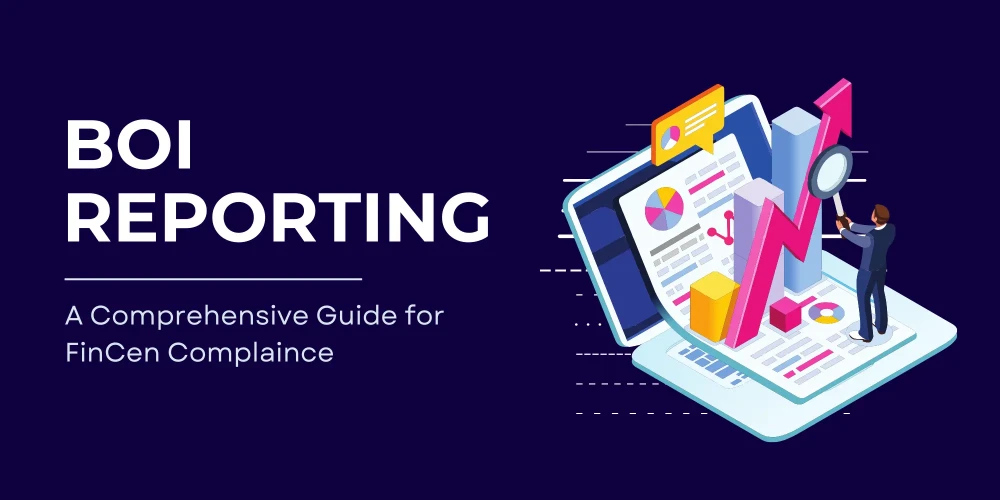Table of Contents
A Comprehensive Guide to Beneficial Ownership Information (BOI) Reporting
Transparency in corporate ownership has become a cornerstone of modern business regulation. Beneficial Ownership Information (BOI) reporting, mandated by the Financial Crimes Enforcement Network (FinCEN), requires businesses to disclose individuals who control or benefit from their operations. This requirement combats illicit activities such as money laundering, tax evasion, and fraud by ensuring that entities cannot hide behind anonymous ownership structures. This guide provides detailed insights into BOI reporting, covering its purpose, compliance requirements, reporting processes, and strategies for maintaining adherence to regulations. By understanding the intricacies of BOI reporting, businesses can protect themselves from regulatory risks and build a foundation of trust and accountability.
What is Beneficial Ownership Information?
Beneficial Ownership Information (BOI) refers to data that identifies individuals with significant control or influence over a company. Unlike shareholders or directors who may have minimal decision-making authority, beneficial owners typically exert substantial influence through ownership stakes, voting power, or access to financial benefits. BOI reporting brings these individuals to light, ensuring transparency and preventing misuse of corporate entities for unethical purposes.
Key Characteristics of Beneficial Owners
- Ownership of Shares
Beneficial owners are individuals owning 25% or more of a company’s shares. This threshold ensures that those with meaningful influence are identified. However, in some cases, ownership percentages may be lower but still result in significant control. - Control Over Decisions
Beyond ownership, beneficial owners often have authority over significant decisions such as mergers, financial strategies, or executive appointments. This control can be direct (e.g., as an officer) or indirect (e.g., through influence over shareholders). - Financial Benefits
Beneficial owners may not have formal titles or visible roles but receive profits, dividends, or other financial benefits derived from the company’s success. Identifying these individuals is critical to ensuring fair taxation and compliance.
BOI reporting aligns businesses with global transparency initiatives, reduces exposure to financial crime, and builds credibility with regulators, investors, and partners. For companies of all sizes, understanding who qualifies as a beneficial owner is the first step toward achieving compliance.
Reporting Requirements and Exemptions for FinCEN BOI
FinCEN’s BOI reporting rules create a comprehensive framework for disclosing ownership details. The requirements apply broadly to U.S.-registered entities, ensuring that most companies provide transparency into their ownership structures. However, certain organizations are exempt due to existing regulatory oversight or operational characteristics.
Reporting Requirements
- Covered Entities
The requirement applies to all corporations, limited liability companies (LLCs), and similar entities registered in the United States. Foreign entities conducting business in U.S. jurisdictions must also comply. Small businesses, including sole proprietorships operating as LLCs, are not excluded. - Mandatory Information
BOI reports must include the full name, date of birth, residential address, and a government-issued identification number (e.g., driver’s license, passport) for each beneficial owner. Additionally, businesses must disclose their legal name, address, and Employer Identification Number (EIN). - Timely Updates
Reports must be submitted at the time of registration. Businesses are also required to file updates within 30 days of any ownership changes, ensuring that information remains accurate and current.
Reporting Deadlines
FinCEN has established specific deadlines for BOI reporting:
- Existing Companies (created before January 1, 2024): Must file their initial BOI report by January 1, 2025
- New Companies (created on or after January 1, 2024): Must file within 30 days of registration or formation
- Ongoing Requirement: Any changes in beneficial ownership must be reported within 30 days of occurrence
Exempt Entities
Certain businesses are exempt from BOI reporting due to existing oversight, these include:
- Publicly Traded Companies: These entities already comply with SEC disclosure regulations.
- Banks and Financial Institutions: These organizations are subject to stringent federal and state regulations.
- Inactive Entities: Companies that no longer engage in operations or transactions and meet inactivity criteria are excluded.
By understanding these rules and exemptions, businesses can determine their reporting obligations and avoid unnecessary filings. Regularly reviewing exemptions ensures that businesses remain compliant even as regulatory changes occur.
The BOI Reporting Process
The process of reporting Beneficial Ownership Information involves a series of steps designed to ensure transparency and compliance. Businesses must approach this task methodically, as errors or omissions can result in penalties. A clear understanding of each step helps simplify what may otherwise seem like a complex process.
Step 1: Identifying Beneficial Owners
This initial step involves determining who qualifies as a beneficial owner under FinCEN’s criteria. Consider both direct stakeholders and individuals exerting control indirectly through layered ownership structures or proxies.
Pro-Tip: Use detailed organizational charts to visualize ownership hierarchies. These tools help uncover hidden relationships and simplify reporting preparation.
Step 2: Collecting Accurate Data
Gather all required information for each identified beneficial owner. This includes their legal name, date of birth, address, and a government-issued ID. Verification of these details is essential to ensure compliance.
Pro-Tip: Implement digital tools or third-party platforms to verify identification documents. These systems reduce the risk of errors and ensure data integrity.
Step 3: Filing the BOI Report
Submit the BOI report electronically via FinCEN’s filing system. Ensure that all data fields are completed and supporting documents are uploaded where necessary. Use FinCEN-provided templates to ensure consistency.
Pro-Tip: Maintain a checklist of all required fields and supporting materials before submission. This minimizes errors and accelerates the approval process.
Step 4: Maintaining Updates
BOI compliance doesn’t end with filing. Any changes in ownership or control must be reflected in updated reports within 30 days. Regularly review ownership structures to ensure all changes are captured.
Pro-Tip: Automate reminders using compliance software to alert you of reporting deadlines and the need for periodic reviews.
Following these steps ensures a smooth reporting process while reducing the risk of non-compliance and associated penalties.
Maintaining Compliance for FinCEN BOI
BOI compliance is an ongoing responsibility, not a one-time task. To ensure adherence to FinCEN regulations, businesses must establish robust systems and policies for managing ownership information. Basic strategies include:
- Internal Policies
Develop comprehensive policies that define procedures for identifying beneficial owners, collecting data, and reporting changes. These policies should be easily accessible to employees responsible for compliance. - Employee Training
Train employees on BOI regulations and the importance of compliance. Educating teams helps prevent errors and fosters a culture of accountability within the organization. - Use of Technology
Leverage compliance software to track ownership data and automate updates. Advanced platforms can identify discrepancies in data and provide alerts for reporting deadlines. - Periodic Audits
Conduct regular audits of BOI records to ensure accuracy and completeness. Audits can uncover gaps in data collection or reporting processes and allow for timely corrections.
With these strategies in place, businesses can maintain compliance and safeguard against potential penalties or reputational damage.
Legal Considerations and Recent Developments in FinCEN BOI
The legal framework governing Beneficial Ownership Information (BOI) reporting has evolved significantly in recent years. Driven by the Corporate Transparency Act (CTA) and enforced by FinCEN, these regulations aim to standardize transparency in corporate ownership while aligning with global anti-money laundering (AML) efforts. Businesses must navigate these developments to ensure compliance while adapting to ongoing changes.
Key Legal Considerations
- Corporate Transparency Act (CTA)
The CTA, enacted in 2021, mandates BOI reporting for most U.S.-registered businesses. It outlines the criteria for identifying beneficial owners and specifies penalties for non-compliance. Key elements include strict reporting deadlines, detailed disclosure requirements, and a focus on entities that previously operated under opaque ownership structures. - Data Security Obligations
The information disclosed in BOI reports is highly sensitive. Businesses must ensure the security of collected data, both during submission to FinCEN and in their internal storage systems. Mishandling or unauthorized sharing of BOI data can lead to legal liabilities and reputational harm. - Penalties for Non-Compliance
Non-compliance with BOI reporting requirements can result in severe penalties, including fines of up to $500 per day for late submissions and criminal penalties of up to $10,000 and two years imprisonment for willful violations. Businesses must prioritize timely and accurate reporting to avoid these consequences.
Recent Developments
- Digital Reporting Systems
FinCEN has introduced secure electronic filing systems, making it easier for businesses to submit and update BOI reports. This system reduces manual paperwork but requires businesses to adapt to digital processes. - Global Alignment
The U.S. has taken steps to harmonize BOI regulations with international standards, particularly those set by the Financial Action Task Force (FATF). This ensures greater cooperation in combating cross-border financial crimes. - Expanded Enforcement
Increased funding for FinCEN has enabled more robust enforcement of BOI regulations, including audits and investigations of non-compliant entities.
Understanding these legal considerations and staying informed about regulatory updates allows businesses to navigate the complexities of BOI reporting effectively while safeguarding against risks.
Protecting Your Business Using FinCEN BOI
While BOI reporting is primarily a regulatory requirement, it also offers significant benefits that help businesses protect themselves against financial and reputational risks. By implementing robust BOI practices, companies can ensure greater operational transparency and mitigate potential vulnerabilities.
Key Ways BOI Reporting Protects Your Business
- Fraud Mitigation
Transparency in ownership reduces the likelihood of fraudulent activities such as insider fraud or unauthorized transactions. By clearly identifying beneficial owners, businesses can detect and address potential conflicts of interest or hidden agendas. - Enhanced Governance
Accurate BOI data strengthens corporate governance by clarifying the roles and responsibilities of beneficial owners. This clarity supports more informed decision-making and fosters accountability across the organization. - Reputational Protection
BOI compliance demonstrates a company’s commitment to ethical business practices, enhancing its reputation among stakeholders. Investors, customers, and partners are more likely to trust businesses that prioritize transparency. - Regulatory Shielding
Meeting BOI requirements ensures that companies are protected from penalties and audits that could disrupt operations. It also reduces exposure to legal risks associated with money laundering or tax evasion investigations.
Practical Steps to Maximize Protection
- Implement Robust Systems: Use technology to streamline BOI tracking and updates, ensuring that records remain accurate and secure.
- Train Teams on Compliance: Educate employees about the importance of BOI reporting, ensuring that they understand their roles in maintaining compliance.
- Conduct Regular Reviews: Periodically assess ownership structures and update BOI records to reflect changes promptly.
When businesses view BOI reporting as an opportunity rather than a burden, it becomes a tool for building trust, improving governance, and safeguarding long-term success.
Resources and Support for FinCEN BOI
Navigating BOI compliance can be challenging, but a range of resources and support systems are available to help businesses manage their obligations effectively. These resources can simplify the reporting process, enhance accuracy, and provide valuable guidance on evolving regulations.
Available Resources
- FinCEN Official Guidance
The FinCEN website is a comprehensive resource for understanding BOI regulations. It provides detailed guidance documents, FAQs, and tutorials that clarify reporting requirements, deadlines, and exemptions. - Compliance Software
Advanced compliance tools automate key aspects of BOI reporting, from data collection to submission. Features such as document validation, reporting templates, and automated reminders ensure accuracy and timeliness. Popular tools are tailored to businesses of all sizes. - Legal and Compliance Advisors
Engaging legal experts or compliance consultants ensures businesses receive tailored advice. These professionals can assist in interpreting regulations, identifying beneficial owners, and addressing complex ownership structures. - Training Programs and Workshops
Organizations like trade associations and compliance firms often offer training sessions to educate businesses on BOI reporting best practices. These programs help employees stay updated on regulatory changes and improve internal processes. - Peer Networks
Collaborating with industry peers or joining professional networks provides opportunities to share insights and learn from others’ experiences with BOI compliance.
Tips for Leveraging Resources
- Regularly review FinCEN updates to stay informed about regulatory changes.
- Choose compliance tools that integrate seamlessly with your existing systems and offer robust data security features.
- Schedule periodic consultations with legal advisors to ensure your practices align with the latest standards.
By leveraging these resources, businesses can simplify BOI compliance, reduce the risk of errors, and focus on strategic priorities.
Conclusion
Beneficial Ownership Information (BOI) reporting is more than a regulatory obligation—it’s a vital step toward greater transparency, accountability, and trust in business operations. By understanding the requirements, adopting a structured approach to compliance, and utilizing available resources, businesses can navigate FinCEN’s regulations with confidence. Taking proactive steps not only safeguards against penalties but also strengthens corporate governance and builds stakeholder trust. For businesses seeking to thrive in today’s regulated environment, BOI reporting is a tool for both protection and growth.







